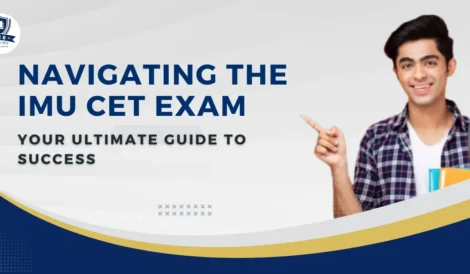Table of Contents
Here are some 6 Easy Tips to Succeed in the SNAP 2024 Exam
The Symbiosis National Aptitude Test (SNAP) is a primary gateway for students aspiring to join MBA programs offered by institutions affiliated with Symbiosis International (Deemed University). This competitive exam evaluates a range of abilities, from general aptitude to specific knowledge areas crucial for business management studies.
Understand the Exam Format
Exam Structure
The SNAP 2024 exam format is designed to test the analytical and verbal abilities of the candidates. It consists of three major sections:
- General English: Includes reading comprehension, verbal reasoning, and verbal ability.
- Analytical & Logical Reasoning: Tests logical reasoning and analytical skills.
- Quantitative, Data Interpretation & Data Sufficiency: Focuses on quantitative data interpretation and sufficiency.
Each section is timed separately, emphasizing the need for effective time management. The exam is conducted online, comprising multiple-choice questions (MCQs), where negative marking applies for incorrect answers.
Types of Questions
Understanding the types of questions typically asked in SNAP can significantly enhance your preparation. Questions are designed to assess comprehension and problem-solving skills under time constraints, making familiarization with the exam pattern a crucial step in your SNAP study plan.
Key Tips
- Review past years’ question papers to understand the question patterns and frequently tested topics.
- Focus on enhancing speed and accuracy by practicing different types of questions that appear in SNAP.
This section provides a foundational understanding of what to expect in the exam, setting the stage for effective, targeted preparation.
Study Regularly with a Plan
Consistent study habits and a well-organized plan are vital for excelling in the SNAP exam. Here’s how you can develop an effective SNAP study plan:
Create a Detailed Study Schedule
Start by breaking down the syllabus into manageable sections and allocate specific times to study each topic. This approach helps ensure that you cover all necessary material without overwhelming yourself.
Key Tips
- Divide your study time between learning new concepts and revising old ones.
- Schedule regular breaks to maintain concentration and avoid burnout.
Set Realistic Goals
Setting achievable goals for each study session can help keep you motivated and track your progress. For instance, aim to master a particular topic or practice a set number of questions per day.
Key Tips
- Use SMART goals (Specific, Measurable, Achievable, Relevant, Time-bound) to guide your study sessions.
- Regularly review and adjust your goals based on your progress and areas of difficulty.
Utilize Varied Resources
Employ a mix of study materials to enhance your learning. This includes textbooks, online courses, study groups, and tutorials.
Key Tips
- Supplement your learning with online resources, such as webinars and interactive quizzes.
- Engage with study groups or forums to discuss and clarify doubts.
A structured study plan not only helps in thorough preparation but also reduces anxiety as the exam approaches. It ensures that all topics are covered systematically and leaves ample time for revision and practice.
Focus on Time Management
Effective time management is crucial for performing well in the SNAP exam, as it allows you to attempt maximum questions with accuracy. Here are some strategies to enhance your time management skills:
Practice with Timers
Simulate exam conditions by practicing with timers. This will help you get accustomed to the pressure of completing tasks within a limited timeframe.
Key Tips
- Use online timers or apps during practice sessions to track how long it takes you to answer questions.
- Gradually reduce the time you allot for each question as your speed and accuracy improve.
Develop a Test-Taking Strategy
Plan your approach to answering questions during the exam. Decide which sections or types of questions to tackle first based on your strengths and weaknesses.
Key Tips
- Start with sections or questions you are most comfortable with to build confidence and momentum.
- Allocate more time to sections that are weighted more heavily or are more challenging for you.
Regular Mock Tests
Taking regular mock tests is integral to improving time management. Mock tests mirror the actual exam conditions and help you practice pacing yourself.
Key Tips
- Analyze your performance after each mock test to identify areas where you can save time.
- Focus on refining your strategy with each test to ensure you can complete all sections within the allotted time.
Mastering time management can significantly increase your chances of scoring higher in the SNAP exam. By knowing how to effectively allocate your time, you can ensure that no questions are left unanswered due to a lack of time.
Take Mock Tests
Regular participation in mock tests is one of the most effective ways to prepare for the SNAP 2024 exam. Mock tests not only reinforce learning but also provide a benchmark to measure your progress. Here’s why and how you should incorporate them into your preparation:
Familiarize with the Exam Environment
Mock tests simulate the real exam environment, helping you to adapt to the format and timing of the SNAP exam.
Key Tips
- Attempt mock tests in a quiet, exam-like setting to accustom yourself to possible distractions.
- Use the same device that you will use on the exam day to get comfortable with the digital format.
Identify Strengths and Weaknesses
Regular mock tests highlight the areas you are good at and the ones that need more attention. This insight allows you to tailor your study plan to focus more on weaker areas.
Key Tips
- After each mock test, spend time analyzing your mistakes and understanding the reasons behind them.
- Prioritize revising topics where you consistently score low.
Boost Confidence and Reduce Anxiety
The more mock tests you take, the more confident you become. This practice helps in reducing pre-exam anxiety, making you more composed on the actual test day.
Key Tips
- Try to simulate different test-taking conditions (e.g., different times of the day) to build adaptability.
- Keep track of your scores and improvements over time to boost your confidence.
Incorporating mock tests into your study schedule is crucial for a comprehensive understanding of how well you are prepared for the exam. They are invaluable in preparing you to perform your best under actual exam conditions
Strengthen Your Weak Areas
Identifying and improving upon your weak areas is crucial to ensure a balanced performance across all sections of the SNAP exam. Here’s how you can effectively target and enhance your weaker subjects:
Identify Weak Points
Start by analyzing your mock test results to pinpoint specific topics or types of questions where you consistently perform poorly.
Key Tips
- Maintain a log of your test scores and note patterns or recurring challenges.
- Discuss your difficulties with teachers or peers to get alternative perspectives and solutions.
Focus on Conceptual Understanding
Often, weaknesses in certain areas stem from a lack of deep understanding of the underlying concepts.
Key Tips
- Go back to the basics: review foundational concepts before tackling more complex problems.
- Use varied resources such as videos, tutorials, and books that can offer different explanations and methods.
Regular Practice
Consistent practice is key to turning weak areas into strengths. Regularly dedicating time to practice can gradually improve your proficiency.
Key Tips
- Allocate more study time to your weaker areas without neglecting your strengths.
- Practice using different types of questions to ensure a well-rounded understanding.
Seek Help When Needed
Don’t hesitate to seek help if you find it difficult to improve on your own. Sometimes, external guidance can provide the push needed to overcome a plateau.
Key Tips
- Consider joining a study group or taking extra classes focused on your weak subjects.
- Utilize office hours or extra sessions offered by instructors.
Strengthening your weak areas requires patience and persistence. With targeted effort and the right strategies, you can transform your weaknesses into assets, ensuring a more comprehensive readiness for the SNAP exam.
Stay Healthy and Stress-Free
Maintaining your health and managing stress are as important as academic preparation for succeeding in the SNAP 2024 exam. Here’s how to keep yourself in top shape mentally and physically during your preparation period:
Maintain a Balanced Diet
Eating a nutritious diet can enhance your cognitive function and energy levels, which are essential for effective studying and peak performance on exam day.
Key Tips
- Incorporate a variety of fruits, vegetables, proteins, and whole grains into your meals.
- Avoid heavy, greasy foods and excessive caffeine, which can disrupt your focus and sleep patterns.
Regular Exercise
Physical activity is known to boost mood and decrease stress. It also improves alertness and concentration, which are crucial for studying.
Key Tips
- Schedule regular exercise sessions, whether it’s a brisk walk, yoga, or any other physical activity you enjoy.
- Even short breaks for stretching or light activity can be beneficial during long study sessions.
Ensure Adequate Sleep
Lack of sleep can significantly impair memory and cognitive processing, reducing your exam performance.
Key Tips
- Aim for 7-8 hours of sleep each night, especially as the exam approaches.
- Try to maintain a consistent sleep schedule to optimize brain function and energy levels.
Stress Management Techniques
Managing stress is crucial to prevent burnout and maintain mental clarity during your preparation.
Key Tips
- Practice relaxation techniques such as deep breathing, meditation, or mindfulness.
- Take short, regular breaks during study sessions to prevent overload and reduce stress.
Staying healthy and managing stress are critical to ensuring that you are physically and mentally prepared for the SNAP exam. By taking care of your body and mind, you can enhance your ability to learn and perform under pressure.
Conclusion
Preparing for the SNAP 2024 exam requires a well-rounded approach that encompasses understanding the exam format, consistent study with a clear plan, effective time management, rigorous practice through mock tests, improving weak areas, and maintaining your health and mental well-being. By following these tips, you can enhance your preparation and increase your chances of success in the exam. Good luck to all SNAP aspirants!
How much time should I allocate daily for SNAP preparation?
Allocate at least 3-4 hours daily for studying, with additional time for breaks and revisions. Adjust based on your personal pace and closer to the exam, you might need to increase your study time.
What is the best way to revise for the SNAP exam?
The best way to revise is by combining reading notes, practicing questions, and taking regular mock tests to apply what you’ve learned in a simulated exam environment.
Are there specific books I should use for SNAP preparation?
While many books are available, choosing updated editions tailored for SNAP that cover all sections comprehensively is advisable. Also, utilize online resources for the latest patterns and practice questions
How can I improve my speed in answering questions during SNAP?
Practice with timed quizzes and mock tests to enhance your speed. Focus on techniques like skipping difficult questions initially and coming back to them if time allows.
What should I do if I consistently score low in mock tests?
Analyze your performance to identify weak areas, focus on strengthening these, and consider seeking help from instructors or study groups to improve.
How important is it to take breaks during SNAP preparation?
Taking regular breaks is crucial to prevent burnout and maintain high productivity levels. Short breaks after every hour of study can help refresh your mind.
What are some effective stress management techniques during exam preparation?
Engage in regular physical activity, maintain social connections, practice mindfulness or meditation, and ensure you have adequate leisure time to unwind.
How early should I start preparing for the SNAP exam?
Starting at least six months in advance is advisable, allowing ample time to cover all topics, revise, and take multiple mock tests to build confidence and improve performance.
Is it useful to form a study group for SNAP preparation?
Yes, study groups can provide motivational support, diversify learning methods, and help clarify doubts through discussion, making them very beneficial.
Can online courses help in SNAP preparation?
Online courses are excellent for providing structured learning and up-to-date material, often including interactive elements like quizzes and live doubt-clearing sessions, which can significantly aid your preparation.








